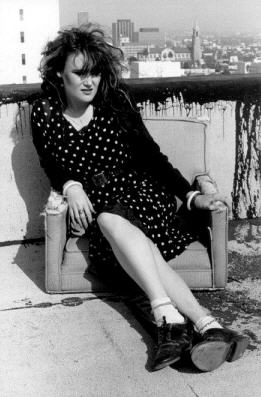FIRST MAJOR UK PIECE ON X REPRINTED FROM SOUNDS JUNE 28TH 1980
X: BEYOND THE VALLEY OF THE DOORS
SILVIE SIMMONS finds intelligent life in Hollywood
HOLLYWOOD PUNK. Sounds
about as real and desirable as
cocktail-lounge muzak. If there's
anything genuine or worthwhile in
there it certainly isn't easy to find.
Which is probably why X and the
few bands like them in Los Angeles
haven't been signed to the
proverbial Big Record Deal like just
about every other local band who
rode in on the wave they helped
start over here.
See, the bearded west coast A & Rmy is more used to dealing with these ageing cokespoons-on-Iegs out in Malibu crooning songs so
sensitive that even the turntable arm lifts to cover its embarrassment, or the latest ego to pop out of Linda Ronstadt's backing band, than it
is to scouring the lamp-posts and empty walls around town for Letrasetted xeroxed fly posters barely visible from behind the wheel of a Merc.
So they signed nothing, and then to be on the safe side they signed everything, at least anything that was thin-tied and tame and looked
pretty when it grimaced. Vegas-style Pistols-punk bands and the whole Mike Yarwood repertoire of Merseyyrockabilly-white reggae
impersonators.
And the few bands like X, the ones who started the Hollywood scene three years ago, even
though they had all the right ingrediants female front person (essential) Exene Cervenka, a tough James Dean type (desirable) bassist-
vocalist John Doe, and two alll American boy-next-door characters (helps with mass acceptance) drummer D. J. Bonebrake and guitarist
Billy Zoom - were left standing on the sidelines like the kids that neither side wants on their team in case some secret flaws would flare up
like acne on the day of the big parade.
Exene: "We've been playing 2 1/2 years and in my
opinion we're this really great band; and in England
it seems like bands get together and play for about
a month and get a recording contract, and then they
come to America and they're feal famous over here
and they paint the Sunset Strip black and white for
their arrival. "I would just hope that people who don't
know what it's like here would realise that a lot of the
bands that were really great broke up because of
being in a place like Los Angelese where there was
just no encouragement and we had to create every
club scene for ourselves. It's been really hard over
here to try to get people to relate to the music. They
fought it for a long time."
X GOT signed eventually - to Slash Records - and
they've just released their first album, "Los Angeles",
produced by former Doors keyboardist Ray Manzarek,
who also donates some shrieking organ to the clean
razor-edged sound. The Doors connection is
interesting, other than the fact that they were all fans
of the 'group, in that Jim Morrison is the only; person
in rock I can think of whose lyrics have had this
particular vision of Los Angeles.
No sun and surf and driveins, no kids selling maps to
the stars homes in Bel Air and Beverley Hills on bright street corners, this leads you through the dark areas; buses, gutters, alleyways, tacky
apartments, a map of the modern mental landscape. Songs about cruel love, cool lovers, violent sex, passion, sickness, gloom and dying.
Lurid details straight out of pulp fiction, National Enquirier, Raymond Chandler, with a compelling and often traditionally-rooted rock sound
and John and Exene's vocals moving in and out of each other almost sensually. Someone else called them the Slick-Balin of punk and you
can see what they meant.
"He bought a sterilized hypo
to shoot a sex machine drug
He got 24 hours
to shoot all Pauline's between the legs ...
L. A. bus door open
kicking both doors open
when it rested on 6th street
That's when he drug a girl inside
he was spreading her legs and didn't understand dying.
She was still awake. "
(' Johnny Hit And Run Pauline')
We're in a two-bed roomed shoebox off the gay hustler section
of Santa Monica boulevard, the front room filled with religeous
relics of no particular denomination ¨cruxifixes, baby Jesuses,
Hindu paintings and billy Zoom's Club 88 best guitarist trophy.
You walk straight in off the street that right now they're digging
up and tearing down for no other reason than to make yet
another homogenized section of town, according to Doe, who
has these theories about a conspiracy to make the whole of the
United States indentically boring.
("It's like the radio Ëœthere's no more FM radio. Once it had a very
free format and now its just the same as AM and it's a really strange
thing to find ourselves in - and I'm sure the same goes for the Clash
and everyone else who's becoming accepted by the radio stations
and the record buying public FM people's minds haven't really
changed. It's not disrupting their status quo ideas about what a
person can do and decide on their own. They haven't adopted
anything different. It's just accepting. Everything's the same.") The
dusty unpaved road reminds you of Ti'juana, tacky border town of
Mexico, where John Doe and Exene went at the Easter weekend to
get married. They share the back room. Billy Zoom sleeps on the
couch.
Don Bonebrake is the only true local. born and raised in North
Hollywood. Billy came from Chicago. played four sets a night for $50
in rockabilly bands that broke up "because nobody wanted to hear it
then." He said that when he heard the Ramones he knew he could
do what he wanted and be able to reach people. He pIayed guitar
with Gene Vincent and Etta James when they came to town.
John came from Baltimore. South of New York, veteran of "a lot of bar
bands." He came to L.A. to escape the east coast and to become a
songwriter. Both Billy and John put almost identical want ads in the
Recycler (an all-purpose advertising rag) and got together. "Then I
met Exene at a writing workshop," said John "and we started going
out together and getting drunk. So I said, 'why don't you join the
band?' and we stole Don from another band. The Eyes (it also
included Charlotte of the Go Gos). I promised him a lifelong supply of
Coca Cola, bubblegum and cigarettes, plus we had a better band."
Exene had come from Florida on the poetry circuit. "I was just writing
when I came to California and didn't really have anything to do. I never
really worried about what I was going to do with my life. I just kept
doing things and having fun, and then I met John and we were both
working on this poetry. This was my first band."
Pretty much figuring that they'd been outcasts living the punk myth
before it had even reached the city of the Big Lights they started
hanging around with the few hard-core musicians and poets who
started out the L.A. punk scene about three years ago around the
Masque Club.
Locally they now have a large and loyal following, and have managed
to live off the music for the last eight months, ditching jobs like
collecting shopping carts at the tourist shopping centre, Farmers
Market, working as a waitress and in record stores, or John's job
history, "working in an Adult bookstore and a straight bookstore and as a telephone salesman where you call people up in the Mid-west and
convince them that you can sell them things for really cheap when they're really triple the price they can buy them in local stores - a real
shyster job."
THE BAND met Ray Manzarek a couple of months before they were due'to make their first album before they signed with Slash. "He saw us
at the Whisky and really loved us and called up our manager and said. 'get me that band! Just like the movies, yeah. It's really when I first
got a band together at 15 or 16, if at that point I'd lied I'd have said, 'please recreate me as Jim Morrison,' Then I move to L.A. and who do I
end up being closely associated with than I person I idolised when I was in my teens. "
Originally they were going to make a demo tape with Manzarek and have him do the whole record company tour with it, using his influence,
until they found out that it was almost as negligible as theirs and settled with Slash because they knew then and because it was the only
offer they got.
"We had the opportunity to make a record and have a lot of control over it, plus we knew the people at Slash understood us and we could
work with them. If we had a big money offer to sign to a major record company now I think we'd turn it down. I don't think they could market
something that they couldn't understand."
Things worked well with Manzarek. "And the press was coming out saying, 'Ray Manzarek's really going to fuck up this record. He's going to
stick a lot of keyboard on it and tell them what to do.' That just wasn't the case."
Exene: "It wasn't like, 'ooh thank you Ray, we'll be sending your cheque in the mail, 'bye' and walking away and punching the time clock on
this person because you needed him to further your career. "
Manzarek joined X in a powerful show at the Whisky where they premiered 'Los Angeles' for their fans just before its release. It was a
moving night, in many ways. Between shows, police arrived with the tragic news that Exene's sister Mirielle, star of the New York
underground film "Ecstatic Stigmatic", had died nearby in a car crash.
''I'd thought, God, what's going to happen when we get famous and we're going to make money and live in this nice place, and then what?"
says Exene. "I'll never be able to write songs because I'm so happy. But no-one's ever going to be that happy. There's enough misery going
on in life whether you're rich or poor or anything. Money comes in handy when you have to make funeral arrangements. Other than that I
don't think it does much good when you're sad. My sister just died two months ago and if that doesn't make enough desperation and
sadness in my life, then I don't know what does."
EXENE and John write the songs together. Usually Exene comes up with a set of lyrics and John adds the music,
"'t's a sad thing that your creative spark comes from misery, but it's true", adds John. Exene doesn't find the religious relics that litter the
room particulariy miserable. She says she's attracted by the ancientness of the symbols. "People will read this and if you say. 'ooh you've
got crucifixes and baby Jesus over there - doesnt everybody? Everybody I know has as much or more.
"When I was real young I tried out every religion, but now I don't belive in it. I believe in being a good person just in case you have to carry
things through after you die. You might realise after you die that you fucked up real bad because you didn't take responsibility for yourself. "
"Our images and our music and our whole approach", says John, "has grown out of us living in basically an urban community surrounded by
a lot of rich and oblivious people who live in this beach-sunlight-natural foods kind of thing. The people who think the whole of Los Angeles
is like that should listen to a song by Woody Gutherie called 'Do Ray Me':
They say California's a Garden of Eden/
A Paradise for everyone to see/
But believe it or not you won't find it so hot/
If you don't have the Dough Ray Me!' "
"Nausea" (by X):
"today you're gonna be sick/
so sick/You'll prop your forehead on the sink/
say oh Christ of Jesur/
Christ my head's gonna crack like a bank. "
Los Angeles: there is intelligent life out there.
THE END
Addiitional imagery from X's Myspace & the Don't Care Collection.
(Interview reprinted from Sounds June 28th 1980 from the Dont Care Archives)
www.xtheband.com/
www.myspace.com/x
X: BEYOND THE VALLEY OF THE DOORS
SILVIE SIMMONS finds intelligent life in Hollywood
HOLLYWOOD PUNK. Sounds
about as real and desirable as
cocktail-lounge muzak. If there's
anything genuine or worthwhile in
there it certainly isn't easy to find.
Which is probably why X and the
few bands like them in Los Angeles
haven't been signed to the
proverbial Big Record Deal like just
about every other local band who
rode in on the wave they helped
start over here.
See, the bearded west coast A & Rmy is more used to dealing with these ageing cokespoons-on-Iegs out in Malibu crooning songs so
sensitive that even the turntable arm lifts to cover its embarrassment, or the latest ego to pop out of Linda Ronstadt's backing band, than it
is to scouring the lamp-posts and empty walls around town for Letrasetted xeroxed fly posters barely visible from behind the wheel of a Merc.
So they signed nothing, and then to be on the safe side they signed everything, at least anything that was thin-tied and tame and looked
pretty when it grimaced. Vegas-style Pistols-punk bands and the whole Mike Yarwood repertoire of Merseyyrockabilly-white reggae
impersonators.
And the few bands like X, the ones who started the Hollywood scene three years ago, even
though they had all the right ingrediants female front person (essential) Exene Cervenka, a tough James Dean type (desirable) bassist-
vocalist John Doe, and two alll American boy-next-door characters (helps with mass acceptance) drummer D. J. Bonebrake and guitarist
Billy Zoom - were left standing on the sidelines like the kids that neither side wants on their team in case some secret flaws would flare up
like acne on the day of the big parade.
Exene: "We've been playing 2 1/2 years and in my
opinion we're this really great band; and in England
it seems like bands get together and play for about
a month and get a recording contract, and then they
come to America and they're feal famous over here
and they paint the Sunset Strip black and white for
their arrival. "I would just hope that people who don't
know what it's like here would realise that a lot of the
bands that were really great broke up because of
being in a place like Los Angelese where there was
just no encouragement and we had to create every
club scene for ourselves. It's been really hard over
here to try to get people to relate to the music. They
fought it for a long time."
X GOT signed eventually - to Slash Records - and
they've just released their first album, "Los Angeles",
produced by former Doors keyboardist Ray Manzarek,
who also donates some shrieking organ to the clean
razor-edged sound. The Doors connection is
interesting, other than the fact that they were all fans
of the 'group, in that Jim Morrison is the only; person
in rock I can think of whose lyrics have had this
particular vision of Los Angeles.
No sun and surf and driveins, no kids selling maps to
the stars homes in Bel Air and Beverley Hills on bright street corners, this leads you through the dark areas; buses, gutters, alleyways, tacky
apartments, a map of the modern mental landscape. Songs about cruel love, cool lovers, violent sex, passion, sickness, gloom and dying.
Lurid details straight out of pulp fiction, National Enquirier, Raymond Chandler, with a compelling and often traditionally-rooted rock sound
and John and Exene's vocals moving in and out of each other almost sensually. Someone else called them the Slick-Balin of punk and you
can see what they meant.
"He bought a sterilized hypo
to shoot a sex machine drug
He got 24 hours
to shoot all Pauline's between the legs ...
L. A. bus door open
kicking both doors open
when it rested on 6th street
That's when he drug a girl inside
he was spreading her legs and didn't understand dying.
She was still awake. "
(' Johnny Hit And Run Pauline')
We're in a two-bed roomed shoebox off the gay hustler section
of Santa Monica boulevard, the front room filled with religeous
relics of no particular denomination ¨cruxifixes, baby Jesuses,
Hindu paintings and billy Zoom's Club 88 best guitarist trophy.
You walk straight in off the street that right now they're digging
up and tearing down for no other reason than to make yet
another homogenized section of town, according to Doe, who
has these theories about a conspiracy to make the whole of the
United States indentically boring.
("It's like the radio Ëœthere's no more FM radio. Once it had a very
free format and now its just the same as AM and it's a really strange
thing to find ourselves in - and I'm sure the same goes for the Clash
and everyone else who's becoming accepted by the radio stations
and the record buying public FM people's minds haven't really
changed. It's not disrupting their status quo ideas about what a
person can do and decide on their own. They haven't adopted
anything different. It's just accepting. Everything's the same.") The
dusty unpaved road reminds you of Ti'juana, tacky border town of
Mexico, where John Doe and Exene went at the Easter weekend to
get married. They share the back room. Billy Zoom sleeps on the
couch.
Don Bonebrake is the only true local. born and raised in North
Hollywood. Billy came from Chicago. played four sets a night for $50
in rockabilly bands that broke up "because nobody wanted to hear it
then." He said that when he heard the Ramones he knew he could
do what he wanted and be able to reach people. He pIayed guitar
with Gene Vincent and Etta James when they came to town.
John came from Baltimore. South of New York, veteran of "a lot of bar
bands." He came to L.A. to escape the east coast and to become a
songwriter. Both Billy and John put almost identical want ads in the
Recycler (an all-purpose advertising rag) and got together. "Then I
met Exene at a writing workshop," said John "and we started going
out together and getting drunk. So I said, 'why don't you join the
band?' and we stole Don from another band. The Eyes (it also
included Charlotte of the Go Gos). I promised him a lifelong supply of
Coca Cola, bubblegum and cigarettes, plus we had a better band."
Exene had come from Florida on the poetry circuit. "I was just writing
when I came to California and didn't really have anything to do. I never
really worried about what I was going to do with my life. I just kept
doing things and having fun, and then I met John and we were both
working on this poetry. This was my first band."
Pretty much figuring that they'd been outcasts living the punk myth
before it had even reached the city of the Big Lights they started
hanging around with the few hard-core musicians and poets who
started out the L.A. punk scene about three years ago around the
Masque Club.
Locally they now have a large and loyal following, and have managed
to live off the music for the last eight months, ditching jobs like
collecting shopping carts at the tourist shopping centre, Farmers
Market, working as a waitress and in record stores, or John's job
history, "working in an Adult bookstore and a straight bookstore and as a telephone salesman where you call people up in the Mid-west and
convince them that you can sell them things for really cheap when they're really triple the price they can buy them in local stores - a real
shyster job."
THE BAND met Ray Manzarek a couple of months before they were due'to make their first album before they signed with Slash. "He saw us
at the Whisky and really loved us and called up our manager and said. 'get me that band! Just like the movies, yeah. It's really when I first
got a band together at 15 or 16, if at that point I'd lied I'd have said, 'please recreate me as Jim Morrison,' Then I move to L.A. and who do I
end up being closely associated with than I person I idolised when I was in my teens. "
Originally they were going to make a demo tape with Manzarek and have him do the whole record company tour with it, using his influence,
until they found out that it was almost as negligible as theirs and settled with Slash because they knew then and because it was the only
offer they got.
"We had the opportunity to make a record and have a lot of control over it, plus we knew the people at Slash understood us and we could
work with them. If we had a big money offer to sign to a major record company now I think we'd turn it down. I don't think they could market
something that they couldn't understand."
Things worked well with Manzarek. "And the press was coming out saying, 'Ray Manzarek's really going to fuck up this record. He's going to
stick a lot of keyboard on it and tell them what to do.' That just wasn't the case."
Exene: "It wasn't like, 'ooh thank you Ray, we'll be sending your cheque in the mail, 'bye' and walking away and punching the time clock on
this person because you needed him to further your career. "
Manzarek joined X in a powerful show at the Whisky where they premiered 'Los Angeles' for their fans just before its release. It was a
moving night, in many ways. Between shows, police arrived with the tragic news that Exene's sister Mirielle, star of the New York
underground film "Ecstatic Stigmatic", had died nearby in a car crash.
''I'd thought, God, what's going to happen when we get famous and we're going to make money and live in this nice place, and then what?"
says Exene. "I'll never be able to write songs because I'm so happy. But no-one's ever going to be that happy. There's enough misery going
on in life whether you're rich or poor or anything. Money comes in handy when you have to make funeral arrangements. Other than that I
don't think it does much good when you're sad. My sister just died two months ago and if that doesn't make enough desperation and
sadness in my life, then I don't know what does."
EXENE and John write the songs together. Usually Exene comes up with a set of lyrics and John adds the music,
"'t's a sad thing that your creative spark comes from misery, but it's true", adds John. Exene doesn't find the religious relics that litter the
room particulariy miserable. She says she's attracted by the ancientness of the symbols. "People will read this and if you say. 'ooh you've
got crucifixes and baby Jesus over there - doesnt everybody? Everybody I know has as much or more.
"When I was real young I tried out every religion, but now I don't belive in it. I believe in being a good person just in case you have to carry
things through after you die. You might realise after you die that you fucked up real bad because you didn't take responsibility for yourself. "
"Our images and our music and our whole approach", says John, "has grown out of us living in basically an urban community surrounded by
a lot of rich and oblivious people who live in this beach-sunlight-natural foods kind of thing. The people who think the whole of Los Angeles
is like that should listen to a song by Woody Gutherie called 'Do Ray Me':
They say California's a Garden of Eden/
A Paradise for everyone to see/
But believe it or not you won't find it so hot/
If you don't have the Dough Ray Me!' "
"Nausea" (by X):
"today you're gonna be sick/
so sick/You'll prop your forehead on the sink/
say oh Christ of Jesur/
Christ my head's gonna crack like a bank. "
Los Angeles: there is intelligent life out there.
THE END
Addiitional imagery from X's Myspace & the Don't Care Collection.
(Interview reprinted from Sounds June 28th 1980 from the Dont Care Archives)
www.xtheband.com/
www.myspace.com/x
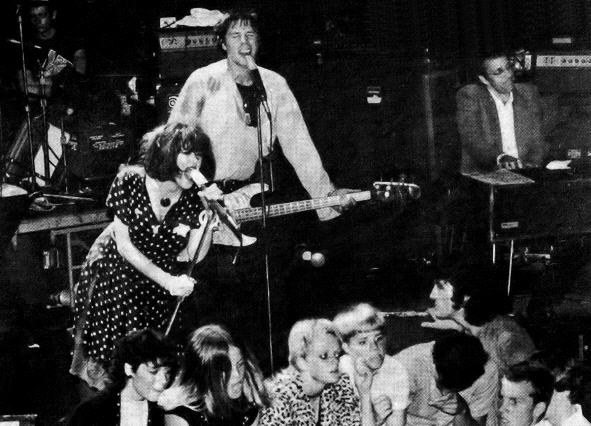
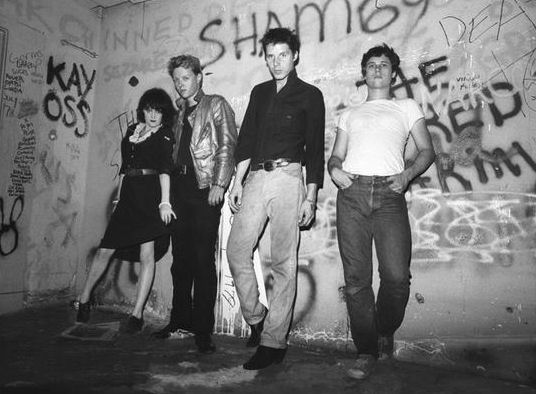

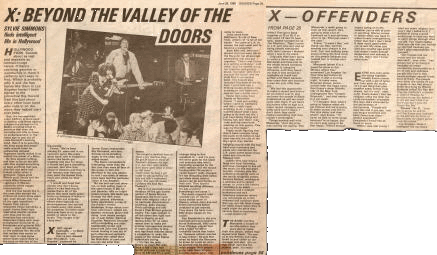
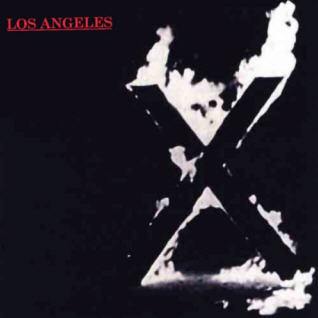
X
Los Angelese
(Red Rhino)
X's debut album, Los Angeles, was
released in 1980 and was produced
by Ray Manzarek of The Doors. X
emerged out of the burgeoning L.A.
punk rock scene of the late 70's.
Unlike most of their contemporaries
who were more raw style than
substance, X consisted of gifted
musicians. They fused the raw power
& frenzied emotion of punk with
strands of rockabilly and country
twang. The quartet of Exene
Cervenka on vocals, John Doe on
bass, Billy Zoom on guitar and DJ
Bonebrake on drums were
supplemented by Mr. Manzarek on
keyboards. The nine songs are quick
bursts of power and precision. The
opening track's spurned lover fury of
"The Phone's Off The Hook, But Your
Not", the date rape victim of "Johnny
Hit & Run Pauline", the feverish
remake of The Doors' "Soul Kitchen",
the banality of rich people's existence
in "Sex & Dying In High Society"
(which was used a theme in Bret
Easton Ellis' book Less Than Zero)
and the majesty of the title track, the
album's finest moment. The reissue is
augmented beautifully by five tracks.
X was a band never destined for
mainstream success, but nearly a
quarter of a century later, this album
as with much of their music, still
sounds fresh and vital.
Thomas Magnum (NJ, USA) 2001
Los Angelese
(Red Rhino)
X's debut album, Los Angeles, was
released in 1980 and was produced
by Ray Manzarek of The Doors. X
emerged out of the burgeoning L.A.
punk rock scene of the late 70's.
Unlike most of their contemporaries
who were more raw style than
substance, X consisted of gifted
musicians. They fused the raw power
& frenzied emotion of punk with
strands of rockabilly and country
twang. The quartet of Exene
Cervenka on vocals, John Doe on
bass, Billy Zoom on guitar and DJ
Bonebrake on drums were
supplemented by Mr. Manzarek on
keyboards. The nine songs are quick
bursts of power and precision. The
opening track's spurned lover fury of
"The Phone's Off The Hook, But Your
Not", the date rape victim of "Johnny
Hit & Run Pauline", the feverish
remake of The Doors' "Soul Kitchen",
the banality of rich people's existence
in "Sex & Dying In High Society"
(which was used a theme in Bret
Easton Ellis' book Less Than Zero)
and the majesty of the title track, the
album's finest moment. The reissue is
augmented beautifully by five tracks.
X was a band never destined for
mainstream success, but nearly a
quarter of a century later, this album
as with much of their music, still
sounds fresh and vital.
Thomas Magnum (NJ, USA) 2001
